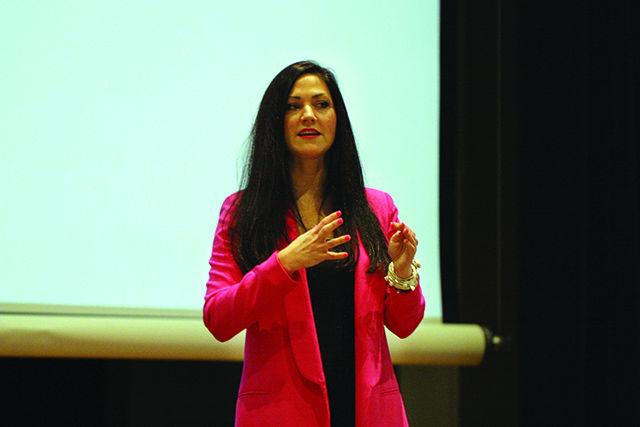Cindy Whitehead, CEO of Sprout Pharmaceuticals, the company behind the controversial female libido pill, came to Nelson Hall’s auditorium Wednesday night to give a talk about the small, pink pill.
The small, pink pill, called Addyi, is often incorrectly referred to as “female Viagra,” but Whitehead is on a campaign to change the name because it does not accurately describe how the pill works.
“Media dubbed us ‘female Viagra’, and I wish they hadn’t,” Whitehead said. “First step in education is to not call it female Viagra.”
The FDA approved Addyi in August, and the pill has been available by prescription for roughly two weeks.
Sprout Pharmaceuticals, the startup company behind Addyi, is located in the Captrust buildings in North Hills of Raleigh. After the FDA approved Addyi, the drug received national attention, spanning the last several months, as being the first female libido pill to help treat hypoactive sexual desire disorder. HSDD is the most common sexual disorder in women.
Although HSDD was discovered in 1977, it wasn’t until seven years ago that there were brain scan trials that showed definitive proof of it. Whitehead said that part of the reason for the little research and medicine development was that society was uncomfortable with the topic and often attributed the problem to being “in your head” as opposed to a medical condition.
“Sex is complex,” Whitehead said. “Men and women alike bring biology into the bedroom, and biology was where women were being underserved.”
The FDA originally rejected Addyi when it was first proposed in 2010. Whitehead sold her previous startup Slate to help fund trials so that Addyi would eventually be approved. According to Whitehead, FDA believed that the benefit was too small to be worth the risks.
“Here is the basis of drug approval: All drugs come down to risk and benefit,” Whitehead said. “We characterize those and turn over the decisions to the patients and providers. FDA thought the benefit was only modest, so why expose women to the risk? In our clinical trials, modest was meaningful. So we disputed.”
Feb. 14, Sprout submitted 1 million pages of data to the FDA for re-approval. The original submission in 2010 was 100,000 pages of data. Whitehead said most pharmaceuticals submit about 1,000 pages, but Whitehead said she wanted to be thorough.
Letters from supporters and congresswomen encouraged Sprout to keep going through the difficult approval process, according to Whitehead.
North Carolina’s Secretary of State, Elaine Marshall, was among the 200 attendees of the event and participated during the question and answer session at the end. Marshall stated that she was proud of what Sprout Pharmaceuticals is doing in North Carolina.
The long processes of approval from the FDA hurts small businesses, according to Whitehead. Sprout spent five years going through trials for the FDA, something that cost millions.
“As a small business owner, it is exceptional to have support for small business,” Whitehead said. “If you look at the process of the FDA, it’s potentially a door shutter to be asked to do one extra trial that costs millions.”
Whitehead explained that most of the innovation comes from small companies.
“The big companies often buy the innovation of small companies,” Whitehead said. “But if the process is long, it can be the difference between a program that continues or goes away for something that has the potential to be a medical breakthrough.”
NC State graduates represent 41 percent of base employees at Sprout. Many recruits from NC State were hired because they fit the culture and attributed to being part of the reason for visiting NC State, according to Whitehead.
“I was just so honored to be asked [to come here] because so many of employees came out of [the] NC State program,” Whitehead said. “As a member of this community, I see such great entrepreneurial qualities out of students who graduate from NC State. They really do stand out.”
Sprout hopes to push to release Addyi in Canada. Helping women around the world is the main reason Whitehead pushed to develop Addyi.
“In the world of medicine, here is what I would like to see changed,” Whitehead said. “I would like to see women advocate for themselves and when they do describe their own experience, it’s respected.”








